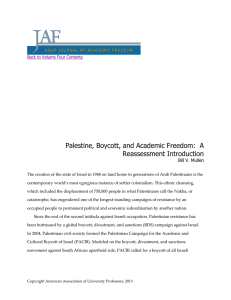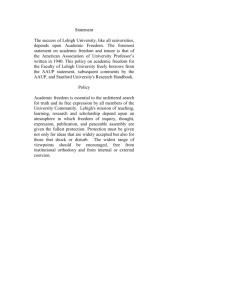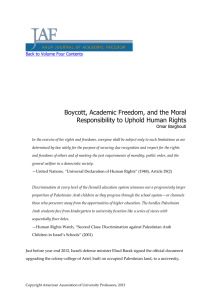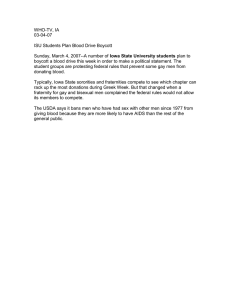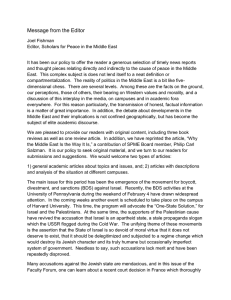The Israeli State of Exception and the Case for Academic Boycott
advertisement
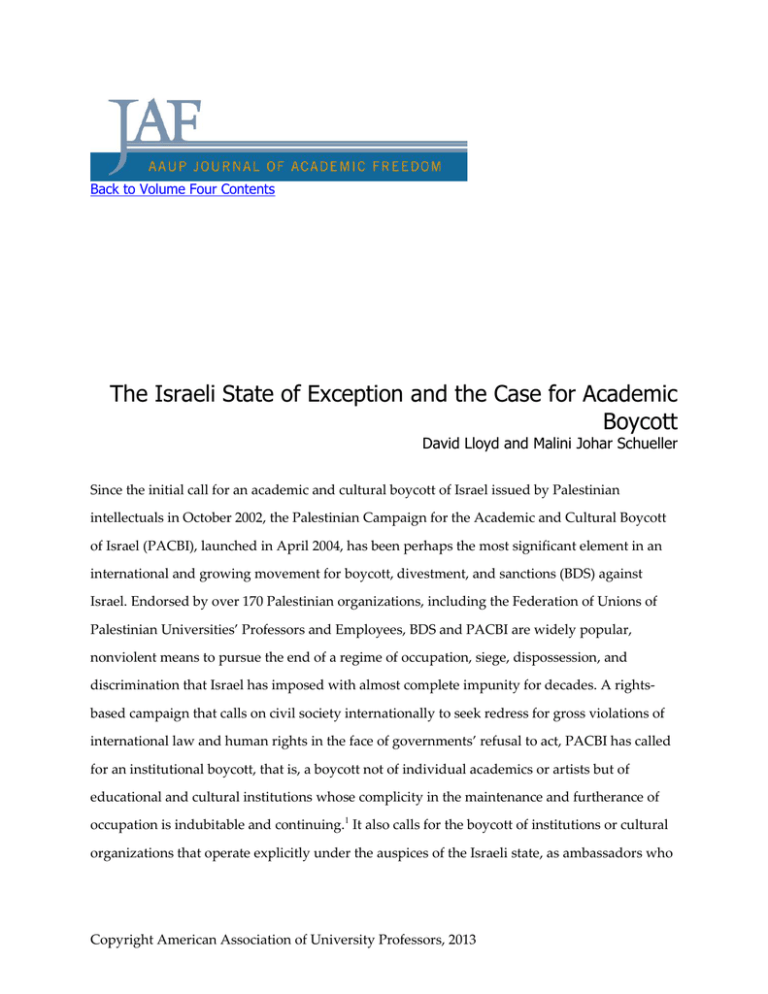
Back to Volume Four Contents The Israeli State of Exception and the Case for Academic Boycott David Lloyd and Malini Johar Schueller Since the initial call for an academic and cultural boycott of Israel issued by Palestinian intellectuals in October 2002, the Palestinian Campaign for the Academic and Cultural Boycott of Israel (PACBI), launched in April 2004, has been perhaps the most significant element in an international and growing movement for boycott, divestment, and sanctions (BDS) against Israel. Endorsed by over 170 Palestinian organizations, including the Federation of Unions of Palestinian Universities’ Professors and Employees, BDS and PACBI are widely popular, nonviolent means to pursue the end of a regime of occupation, siege, dispossession, and discrimination that Israel has imposed with almost complete impunity for decades. A rightsbased campaign that calls on civil society internationally to seek redress for gross violations of international law and human rights in the face of governments’ refusal to act, PACBI has called for an institutional boycott, that is, a boycott not of individual academics or artists but of educational and cultural institutions whose complicity in the maintenance and furtherance of occupation is indubitable and continuing.1 It also calls for the boycott of institutions or cultural organizations that operate explicitly under the auspices of the Israeli state, as ambassadors who Copyright American Association of University Professors, 2013 AAUP Journal of Academic Freedom Volume Four 2 seek to normalize the occupation and to promote a benevolent image of Israel as part of its campaign of propaganda (hasbara). Despite the AAUP’s history of censuring governments and institutions for violations of academic and intellectual freedoms, and despite the principled stand that it took against South African apartheid in supporting the divestment campaign, it has to date refused to endorse PACBI’s call for an academic boycott. The grounds that it has given publicly for this refusal are so confused and inconsistent with past policy and practice that we must again clarify the rationale for the boycott and question the exceptional exoneration that the AAUP grants to Israel alone among states. A boycott is a nonviolent instrument that both expresses disapproval of the prolonged conduct of a person or institution that injures others and withdraws material support for that person or institution so long as they persist in such conduct. It is generally called for and applied by those to whom other means of action are denied. That said, a boycott is a specific tactic, deployed in relation to a wider campaign against injustice and under quite determinate circumstances. It should not be exercised indiscriminately in ways that would inevitably be ineffective. The optimal conditions for applying a boycott as a tactic include the following: a. The entity aimed at must be vulnerable to a boycott as a result of its connections with, or dependence on, the nations whose publics boycott it. An economic boycott of the European Union, the United States, or China, for example, would probably be economically ineffectual and thus politically futile, much as we might desire such boycotts in principle. b. There must be a relatively open public sphere in the nation boycotted in order for its citizens to influence their leaders, and the boycotted nation’s citizens must care about the opinion of those boycotting them. This is the case with Israel, as it was with South Africa, since their populations largely wish to be counted among “civilized” or “democratic” Western nations. In both cases the campaign for a cultural and academic boycott exerts more impact than economic sanctions: it goes directly to citizens’ sense of integration in the global cultural community. This is not to say that either South Africa was or that Israel is a 3 The Israeli State of Exception and the Case for Academic Boycott David Lloyd and Malini Johar Schueller democracy in any meaningful sense of the word: apartheid systems function precisely by claiming democratic rights for only a part of their population, and systematically denying those rights to the subordinated remainder. c. The boycott should be explicitly supported by the occupied or oppressed people concerned, who often stand to suffer most from the consequences of its application. This was the case with the divestment campaign against South Africa, called for by the African National Congress (ANC), and is the case with BDS against Israel. d. The boycott must make demands that are realizable by the nation boycotted, like conforming to international law, ending an occupation or blockade, dismantling a racist or apartheid system, negotiating in good faith, and so on. BDS invokes three summary principles, in conformity with the norms of human rights conventions and international law. Israel must: 1. End its occupation and colonization of all Arab lands, end the siege of Gaza, and dismantle the segregation wall; 2. Recognize the fundamental rights of the Arab-Palestinian citizens of Israel to full equality; 3. Respect, protect, and promote the rights of Palestinian refugees to return to their homes and properties as stipulated in UN Resolution 194. e) Finally, a boycott should be based on nonviolent principles, and thus implies a rejection by those engaging in the boycott of the resort to violence. The Palestinian BDS campaign is expressly opposed to all forms of racial, religious, gender, or other discrimination, universally, which accords with its insistence on Israel’s coming into conformity to international law and human rights conventions. To what extent, then, does Israel meet these criteria? To the usual charge that BDS singles Israel out for exceptional sanctions when many nations—including the United States—are guilty of some egregious injustice or aggression, an initial response is simply that the fact that many states infringe international law does not in any way exonerate Israel from its obligations AAUP Journal of Academic Freedom Volume Four 4 to end an illegal occupation or to apply universal standards of human rights. Indeed, it is because Israel is constantly distinguished or singled out from other nations, particularly here in the United States, that a boycott, divestment, and sanctions campaign is justified. As is by now well known, Israel is the largest recipient of US foreign aid, receiving currently about $3 billion per year. US aid underwrites Israel’s commission of war crimes and crimes against humanity, including not only the use of weapons like white phosphorous against civilians, but also such offenses as collective punishment, systematic torture, and the extended occupation of Palestinian territory in violation of the Geneva Conventions. Indeed, Israel has violated more UN resolutions than any other state in the world, including twenty-eight Security Council resolutions that are legally binding on member states, largely because it has been consistently protected from any attempt to enforce those resolutions by the veto power the United States holds on the Security Council.2 Nonetheless, public officials and academics who have critiqued Israel have faced campaigns of distortion, intimidation, threats of termination, and denial or loss of tenure. While Norman Finkelstein’s may be the best-known academic case, campaigns have also targeted scholars like Nadia Abu El Haj, Sami Al-Arian, David Shorter, and David Klein, in direct attempts to restrict their freedom of speech. Well-orchestrated efforts to define criticism of Israel as anti-Semitism or to intimidate Students for Justice in Palestine have resulted in the extraordinary prosecution of the Irvine 11, students who peacefully protested the visit of the Israeli ambassador, or California Senate Resolution, HR 35, which effectively defines peaceful protests against Israeli policies as hateful, and hence prohibited, and is clearly an attempt to model legislation for other states. Israel is singled out most clearly by being the only country that cannot be criticized openly in the United States and on university campuses without serious repercussions. This climate of orchestrated harassment of critics of Zionism, designed to intimidate and silence, bears no comparison with the no less orchestrated complaints by pro-Israel students on campuses that criticism of Israel is tantamount to anti-Semitism. To concede that point would be to undermine the very foundations of the university, which must allow any belief and any 5 The Israeli State of Exception and the Case for Academic Boycott David Lloyd and Malini Johar Schueller political system, political or religious, and however deeply held, to be subjected to reasonable criticism. The censorship that US academics and citizens face regarding criticism of Israel is negligible, however, compared to the daily regime of occupation and siege that denies Palestinian scholars the right to free movement and prevents them from attending classes, taking exams, or studying abroad on fellowships; that subjects universities to frequent and arbitrary closures, constituting collective punishment; or that willfully destroys academic institutions, like the American International School or the Islamic University of Gaza in 2009, which were destroyed along with some twenty other schools and colleges. If there has been anywhere a systematic denial of academic freedom to a whole population, rather than to specific individuals or to institutions, it is surely in Palestine under Israeli occupation.3 Yet it is putatively on the grounds of academic freedom that the AAUP has rejected the academic boycott of Israel. Because the AAUP is a respected body whose opinions are taken seriously by academics worldwide, it is important to trace its position in relation to the boycott and explain why it is untenable. In 2005, responding to the UK Association of University Teachers’ call for a boycott of two Israeli universities, Haifa and Bar-Ilan (another resolution overturned this resolution a few months later), the AAUP condemned the boycott on the basis of academic freedom: Since its founding in 1915, the AAUP has been committed to preserving and advancing the free exchange of ideas among academics irrespective of governmental policies and however unpalatable those policies may be viewed. We reject proposals that curtail the freedom of teachers and researchers to engage in work with academic colleagues, and we reaffirm the paramount importance of the freest possible international movement of scholars and ideas.4 A year later, the AAUP published “On Academic Boycotts” to support its position that boycotts are “prima facie violations of academic freedom.” This condemnation of the academic boycott on the grounds of academic freedom has been thoroughly critiqued by scholars such as Marcy Newman, Lisa Taraki, Omar Barghouti, and Judith Butler, who contend that the AAUP Journal of Academic Freedom Volume Four 6 academic freedom extolled by the AAUP is a geopolitically based privilege rather than a transhistorical right.5 Butler has called for a “more robust conception of academic freedom, one that considers the material and institutional foreclosures that make it impossible for certain historical subjects to lay claim to the discourse of rights itself.”6 Notably, the AAUP allowed critics of its statement to voice their opinions in Academe, thus ironically appearing to many academics, who expressed outrage at these critics, to be condemnatory of Israel. Nothing could be farther from the truth. The AAUP’s deliberations on the academic and cultural boycott of Israeli universities effectively promoted the idea of Israel as Agamben’s state of exception. Just as the state of Israel governs through an order “that allows for the physical elimination not only of political adversaries but of entire categories of citizens who for some reason cannot be integrated into the political system,”7 the AAUP has proceeded to eliminate the rights of Palestinians from its arguments. The academic boycott statement referred to the 1940 Statement of Principles on Academic Freedom and Tenure: “institutions of higher education are conducted for the common good . . . [which] depends upon the free search for truth and its free exposition.” But if universities are conducted for a universal idea of the common good, the grounds for the academic boycott of Israeli universities seem fairly obvious. The common good of the Islamic University of Gaza cannot be served by bombing it; neither can a university function for the common good if it is established in a settlement area: witness Ariel College, a West Bank campus of Bar-Ilan University, now Ariel University Center of Samaria, fully accredited in July 2012.8 Established illegally under international law, on occupied Palestinian territory, it is open only to Jewish academics and students, a separate and unequal apartheid institution. The question undoubtedly becomes, for whose common good are universities established? Whose common good matters? How should the common good be defined in a country under occupation? Once we interrogate the particularity of the common good, it becomes clear that this notion operates under the aegis of a liberal humanism that ignores colonialism or racial oppression. While both early Zionists and contemporary leaders have been brazen about the settler colonial nature of 7 The Israeli State of Exception and the Case for Academic Boycott David Lloyd and Malini Johar Schueller Israel’s enterprise, all of the AAUP’s statements are noteworthy for the absence of any mention of Israeli colonialism or its repressive military. Let us reflect on this willful blindness: the words colonialism and occupation simply do not appear in the Association’s statements. Next, the AAUP distinguished censure, “which brings public attention to an administration that has violated the organization’s principles and standards,” from a boycott. “Throughout its history,” the AAUP claimed, it had “approved numerous resolutions condemning regimes and institutions that limit the freedoms of citizens and faculty,” but only in the case of South Africa had it supported resolutions both of condemnation and of divestment. The AAUP not only censured South Africa but actively supported the divestment movement against apartheid. Now it refuses even the censure of Israel. Inconsistent as this is, the contradictions have recently been compounded. The December 2008 bombing of the Islamic University of Gaza, an institution serving twenty thousand students and comprising ten faculties including education, religion, art, medicine, engineering, and nursing, drew no comment from the AAUP. Yet the AAUP in 2007 had continued its commitment to condemning institutions that limited the freedoms of students and faculty by censuring four New Orleans universities for closing departments in the aftermath of Hurricane Katrina; and at its annual meeting in 2008, it condemned the government of Iran for discriminating against and denying educational opportunities to its Baha’i community.9 In 2010, however, the AAUP, responding to allegations of anti-Semitism at UC Berkeley, UC Santa Cruz, and Rutgers, issued a statement in support of free speech but also suggested that university administrators use a working definition of antiSemitism to monitor individual cases. Part of the working definition includes “denying to Jews the right of self-determination (such as by claiming that Zionism is racism).”10 This definition, which confuses criticism of a state with hatred of an ethnoreligious group, itself participates in the larger climate of censorship that we remarked on above. But given that the AAUP accepts the idea that settler colonialism is self-determination and implicitly denies the freedom to criticize Israel to the US-based Palestinian students its policies so drastically affects, should we AAUP Journal of Academic Freedom Volume Four 8 be surprised that the organization has refused to censure Israeli universities, crucial instruments in the extension and maintenance of Israel’s regime of dispossession and settlement? Instead the AAUP has satisfied itself by condemning criticisms of individuals’ writings as part of protecting the speaking of truth. At the 2007 annual meeting of the AAUP, Joan E. Bertin, the plenary speaker, portrayed attacks on Norman Finkelstein, Stephen Walt, and John Mearsheimer as simply part of the taboos against speech about Israel and Palestine and presented these, in a tactic of normalization, as “‘mutually destructive reductionism’ that prevents recognition of alternate views.”11 The report of the speech stressed the need for competing perspectives to foster discussion, thus equating the politics of settler colonialism and Palestinian protest, and assuming that both sides are equally heard in the United States. In the spirit of this condemnation of individual acts—as if they were aberrant from the US government’s support of the Israeli state and its institutions—the AAUP recognizes only the right of individual faculty not to cooperate with institutions while it opposes any systematic boycott that “threatens the principles of free expression and communication on which we collectively depend.”12 It is crucial to repeat that the academic and cultural boycott is against Israeli institutions, all of which are complicit in occupation and create conditions under which the freedoms imagined by the AAUP cannot exist. The boycott does not extend to individual Israeli speakers invited to speak in the United States or to individual scholars writing a paper together. The point of the boycott is structural and is meant to challenge the state of exception through which Israel has escaped reprimand or penalty and has created conditions under which the rights of Palestinian scholars, academics, and students are routinely suppressed. In this context, it becomes a luxury for North American academics to appeal to a distinctly one-sided and restrictive version of the principles of academic freedom while accepting complicity in the denial of those rights to not just individuals but whole populations. We would do well to remember the words of Howard Zinn in a lecture in South Africa during apartheid: “To me, academic freedom has always meant the right to insist that freedom be more than academic—that the university, because of its special claim to be a place for the 9 The Israeli State of Exception and the Case for Academic Boycott David Lloyd and Malini Johar Schueller pursuit of truth, be a place where we can challenge not only ideas but the institutions, the practices of society, measuring them against millennia-old ideals of equality and justice.”13 If academic freedom is, indeed, a universal value, not one restricted to a few who are privileged by geography and colonial histories, then the Palestinian call for an academic and cultural boycott of Israel becomes, as South Africa was in the 1980s, a test case for our intellectual and moral consistency. If we or the AAUP refuse to endorse that call, then the commitment to academic freedom becomes vacuous and meaningless, an assertion of privilege and entitlement, not of fundamental values. Palestinian education, like Palestinian culture and civil society, has been systematically targeted for destruction: it is no longer a matter of the infringement of the free speech of a few individuals but a case in which, in the time-honored manner of settler colonialism, a powerful and well-armed state seeks to extinguish the cultural life and identity of an indigenous people. Not only is the boycott movement the only practical possibility for Palestinian survival, its application is principled and defined in its scope and ends. No clearer case has existed for the extension of an academic boycott since the ANC made its similar call for boycott and divestment in the struggle against South African apartheid. To continue to duck what is increasingly one of the defining moral and political struggles of our time would be not merely inconsistent but intellectually and ethically bankrupt. The oldest US organization representing academics and scholars can do better than that, and it is time for it to do so. We must cease to make an exception of Israel. David Lloyd is Distinguished Professor of English at the University of California, Riverside. His most recent book is Irish Culture and Colonial Modernity (Cambridge, 2011). Malini Johar Schueller is Professor of English at the University of Florida. Her most recent book is Locating Race: Global Sites of Post-colonial Citizenship (2009). AAUP Journal of Academic Freedom Volume Four 10 Notes 1 Uri Yacobi Keller, The Economy of the Occupation: A Socioeconomic Bulletin, no. 23–24 (October 2009), http://usacbi.files.wordpress.com/2009/11/economy_of_the_occupation_23-24.pdf. 2 See Israel Law Center, “Study Guide: International Law and Israel,” February 2007, http://www.israellawresourcecenter.org/internationallaw/studyguides/sgil3i.htm. 3 See Ameera Ahmad and Ed Vulliamy, “In Gaza, the Schools Are Dying Too,” Guardian, January 10, 2009, http://www.guardian.co.uk/world/2009/jan/10/gaza-schools; and Riham Barghouti, “The Struggle for an Equal Right to Academic Freedom,” June 5, 2011, http://www.usacbi.org/2011/06/barghouti-struggle-equalright/. 4 AAUP, “The AAUP Opposes Academic Boycotts,” Academe 91 (July–August 2005): 57. 5 Marcy Jane Knopf-Newman, “The Fallacy of Academic Freedom and the Academic Boycott of Israel,” CR: The New Centennial Review 8.2 (2008): 87–110; Judith Butler, “Israel/Palestine and the Paradoxes of Academic Freedom,” Radical Philosophy 135 (January–February 2006): 10; Omar Barghouti and Lisa Taraki, “Academic Freedom in Context,” Al-Ahram Weekly, no. 747 (June 2005): 16–22. 6 Butler, “Israel/Palestine,” 16. 7 Giorgio Agamben, State of Exception, trans. Kevin Attell (Chicago: University of Chicago Press, 2005), 2. 8 Jonathan Cook, “Israel Creates First Army-Owned University,” Znet: A Community of People Committed to Social Change, January 25, 2010, http://www.zcommunications.org/israel-creates-first-army-owneduniversity-by-jonathan-cook. 9 AAUP, “2008 Annual Meeting Resolutions,” http://www.aaup.org/AAUP/about/anmtgs/2008resolutions.htm. 10 Cary Nelson and Kenneth Stern, “Anti-Semitism on Campus,” AAUP Member Newsletter, April 21, 2011. 11 “Telling the Truth in Difficult Times,” Academe 93 (July–August 2007): 14. 12 “AAUP on Academic Boycotts (2006),” http://www.aaup.org/report/academic-boycotts. 13 Howard Zinn, “Academic Freedom: Collaboration and Resistance—The Twenty-Third T. B. Davie Memorial Lecture, Delivered in the University of Cape Town on July 23, 1982” (University of Cape Town, 1982), 6.
